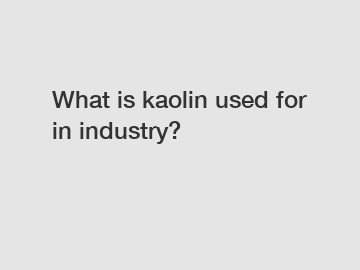What is kaolin used for in industry?
If you want to learn more, please visit our website Yayang.
What is kaolin used for in industry?
Kaolin, also known as china clay, is a versatile industrial mineral that finds extensive applications across various industries. Its unique properties make it an invaluable material in sectors such as paper, ceramics, paints and coatings, rubber, plastics, agriculture, and more.

One of the primary uses of kaolin is in the paper industry. Kaolin is added to paper during the manufacturing process to enhance smoothness, brightness, and printability. The fine particle size and platy structure of kaolin particles allow for the production of high-quality paper with improved opacity and reduced ink absorption. Additionally, kaolin acts as a filler, reducing the need for expensive pulp fibers, thereby making paper production more cost-effective and environmentally sustainable.
In the ceramics industry, kaolin is an essential component in the production of porcelain and other fine ceramics. Its high fusion temperature, unique particle morphology, and low impurity content make it ideal for creating ceramics with excellent strength, thermal resistance, and whiteness. Kaolin also imparts desirable properties such as shrinkage control, better moldability, and improved surface finish to ceramic products.
The paints and coatings industry extensively utilizes kaolin due to its exceptional ability to modify the rheology and provide particle spacing. Kaolin acts as a rheological additive, enhancing the flow properties of paint and preventing sagging or settling. It also improves the opacity, brightness, and coverage of pigments, resulting in vibrant and durable coatings. Furthermore, kaolin's inert nature and high brightness make it an ideal extender pigment, reducing the consumption of expensive titanium dioxide while maintaining desirable color properties.
In the rubber industry, kaolin acts as a reinforcing agent in the production of tires, belts, hoses, and other rubber products. It helps enhance mechanical properties such as tensile strength, tear resistance, and abrasion resistance, thereby improving the overall durability and performance of rubber goods. Kaolin's low moisture absorption and high thermal stability make it suitable for demanding rubber applications.
Apart from these industries, kaolin finds applications in agriculture, pharmaceuticals, plastics, cosmetics, and even in the production of catalysts. Its adsorbent properties make it an effective component of animal feed, pharmaceutical formulations, and personal care products. Additionally, kaolin-based catalysts are utilized in various chemical reactions for their unique catalytic properties.
Overall, the diverse range of applications of kaolin in various industries highlights its significance and the impact it has on enhancing product performance, optimizing manufacturing processes, and promoting sustainability. This versatile industrial mineral continues to play a crucial role in driving innovation and improving the quality of numerous products we use in our daily lives.
For more information, please visit our website.
For more Calcium Carbonate Light Vs Heavyinformation, please contact us. We will provide professional answers.



